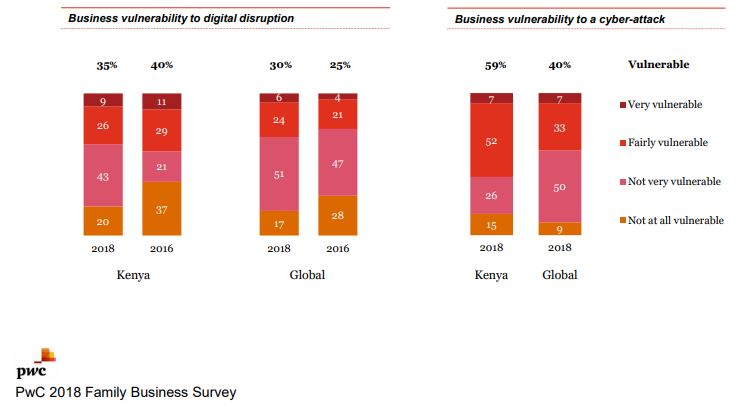As many as 35% of Kenyan family businesses feel vulnerable to digital disruption and 59% feel vulnerable to a cyber-attack according to new research from PwC Kenya.
This is higher than the global average.
Its Kenya’s report themed ‘The values effect: PwC 2018 Family Business Survey’ shows family enterprises are adrift in a sea of confusion when it comes to thriving in the digital economy.
For family business, the first point of call to inspire innovation may be the next generation of family members. -Alex Muriuki, Associate Director, Technology Service PwC Kenya
The specific technological advances cited as challenges by Kenya survey respondents include cybersecurity (39%) and digitisation (30%) and 67% of Kenya respondents are aiming to take significant steps in terms of digital capabilities in the next two years, compared to 57% of global respondents.
“These discrepancies between Kenya and global respondents shows that Kenya’s family businesses feel more vulnerable, overall than their global counterparts but they are investing in digital capabilities — perhaps helping them to feel more confident about the changes ahead,” reads part of the report.
“Our survey shows that Kenya’s family businesses may feel more vulnerable, overall, than their global counterparts but they are investing in digital capabilities – perhaps helping them to feel more confident about the changes ahead,” said Michael Mugasa, Partner PwC Kenya and the firm’s Private Company Services Leader.
RELATED: PwC Report: 17% of Kenyan Family Businesses Have Formal Succession Plan

Alex Muriuki, Associate Director, Technology Service PwC Kenya further notes that “While the threat of disruption is real, family businesses should also look at these trends positively and focus on the opportunities provided by these technologies to support innovation of their businesses, increase efficiency and provide better experiences for customers.”
Currently, the survey says companies are deploying chatbots to provide a more responsive customer service experience. Others are adopting robotics process automation to automate manual repetitive and rule based tasks to increase productivity, lower costs and reduce human errors.




